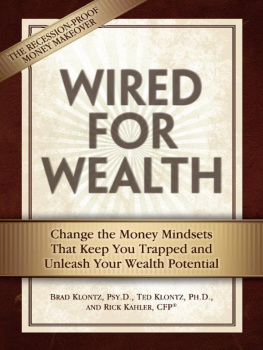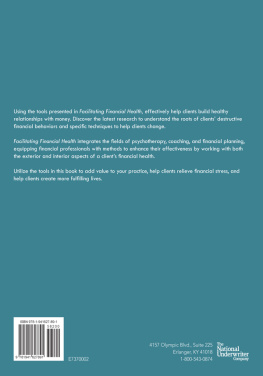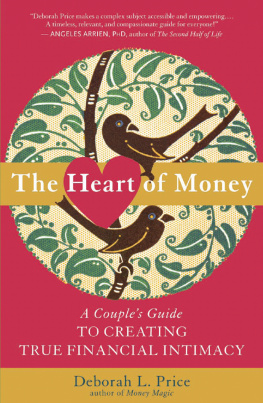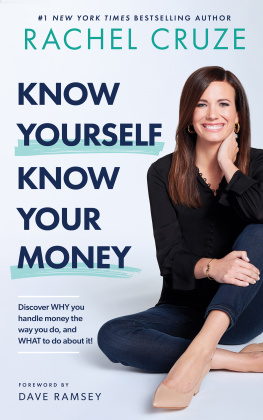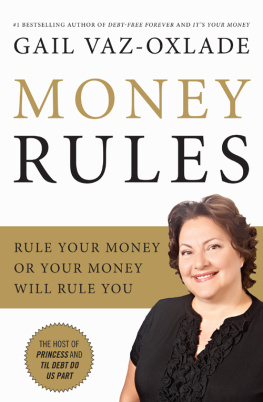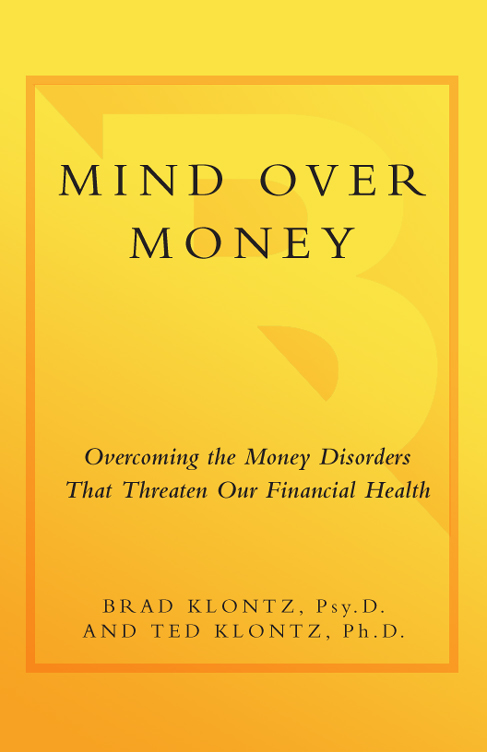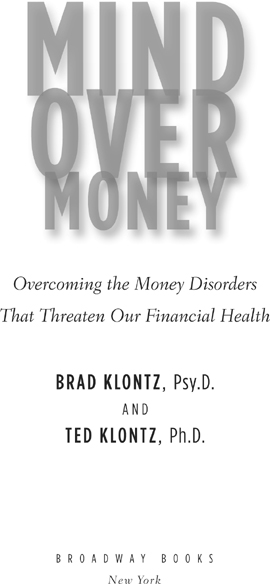4.
11.
INTRODUCTION
W hat prompted you to pick up this book? Are you stressed about money? Are you worried about your overspending or your inability to save? Maybe your finances are sound but you still cant overcome your anxieties about money. Perhaps disagreements about spending are driving a wedge between you and your partner, or maybe youre having trouble talking to your children or other family members about money. Whether youre having difficulties managing your stock portfolio or struggling just to make ends meet, know this: You are not alone. Just about everyone has a complicated relationship with money, and more people than you realize have money relationships that are downright dysfunctional. And just about everyone believes the Big Lie about personal finance.
What is the Big Lie? Its the accusation that your financial difficulties are your fault, that they stem from your being lazy, crazy, greedy, or stupid. Well, they arent, and they dont. Trust us on this. Weve spent years consulting with, coaching, and counseling couples and individuals struggling with money problems. If weve learned anything from that experience, its that chronic self-defeating and self-destructive financial behaviors arent driven by our rational, thinking minds. The truth is, they stem from psychological forces that lie well outside our conscious awareness, and their roots run deep, deep into our past.
Consider the following stories, shared by some of the people weve worked with.
BRIDGET: I was given up for adoption at the age of two, because my mother couldnt afford me. My birth parents had divorced and my mother couldnt support all five of us children so she gave three of us up for adoption. I was in foster care for about two years and I stopped unpacking my suitcase because I would change foster homes with what seemed like no notice. A family adopted one of my older sisters, and when they found out she had a sister in the orphanage they tracked me down. I remember the day my adoptive parents came to my foster home. They were driving a red car. I remember going up in front of the judge and telling him I wanted to go live with them. I remember feeling like such a big girl, twirling around and around in the big wooden chair next to the judges desk. I was four and a half.
My adoptive family was very loving but very dysfunctional. My father was a happy drinker. He wasnt ever abusive but he could certainly tie a drunk on. My mother was, I think, an undiagnosed manic-depressive. Shed be fine one minute and then the next she was horribly depressed, telling us we were about to lose our house and she didnt know where the money was going to come from. I remember, even as a young child, feeling very fearful that if the family ran out of money, theyd send us away again, me or my sister or both of us. Even if we managed to stay together, we might lose our house and everything we had because we didnt have enough money.
What lessons about money do you think that little girl learned? What attitudes about finances did she bring with her into adulthood, and how did they affect her and her relationships? You might expect that shed come to associate not having enough money with emotional abandonment or that shed grow up unable to trust or rely on anyone.
And youd be right. From the time she was a young girl, Bridget constantly worked and saved, but she refused to spend any of her hard-earned moneyshe believed that money and money alone meant security. But no matter how much she saved, she never really felt secure. She was always waiting for the other shoe to drop.
But youd also be wrong, because Bridgets sister reacted very differently. While Bridget became compulsively self-reliant, her sister became passive, dependent, unable to believe she could take care of herself at all. She sank into decades of addiction and homelessness before righting herself.
This story illustrates that similar circumstances may have very different effects on different people. Thats why each of us has to explore and discover our own money history, without worrying about how we should have reacted to the situations we faced.
PAUL: My third brother died shortly after he was born. During the delivery my mom kept telling the nurse, Theres something wrong! Theres something wrong! By that time shed been through eight deliveries, so she had some idea when things werent right. The nurse called the doctor, but he was at the country club playing golf. He didnt make it to the hospital until it was too late and so my brother died.
A month later, the doctor came out to our house in his brand-new Thunderbird. My father and I were out in the yard. The doctor got out of the car and he told my father to pay his bill or he was going to make sure that my father went to jail. My parentssense was, this mans need to play golf had killed my brother. So my father grabbed the doctor and threw him up against the Thunderbird and said, You do whatever you want, but if you continue to pursue me about this bill, I will kill you. He opened the car door and threw this skinny little doctor into the seat and slammed the door He turned to me and said, I want you to mark that well, Paul. All he cares about is his money, not the life he destroyed.
That message followed me all the way through my life. I grew up with the idea that the rich are greedy and they really dont care about people. I grew up believing that money had become their god. I decided that money didnt matter and what I needed to do was just work hard, do a good job, and be known for that.
As an adult, Paul didnt want to become known as the kind of person who cared only about money, so he shied away from dealing with money or even thinking about it. He had trouble negotiating for salary increases, saving for the future, or investing, and he had even more trouble when he tried to relax and enjoy time with his family because working hard was his only measure of self-worth. And as a helping professional himself, he never wanted to be caught playing in case someone needed him in a crisis.
Its easy to see how traumatic experiences like Bridgets and Pauls can make such profound and lasting impressions. But it doesnt take tragedy on this scale to shape our ideas about money, its uses and its meaning. In fact, most of us form our attitudes about money through much more ordinary experiences, doing what all children and adolescents do: observing the influential adults in our lives and puzzling out the reasons for their behavior.
STEPHANIE: When I was twelve years old my parents moved us to the Upper East Side of Manhattan. Wed come from a middle-classcommunity and suddenly we were living in one of the most affluent places in the world. I saw how very privileged people lived their lives, and in some ways my family lived like this, too. We had a big apartment in an exclusive building. We took vacations abroad. There was always money for education, and for art and culture and books. However, my mother often complained about money. We didnt have enough, my dad didnt make enough, and she had to be so frugal. These comments and complaints, always directed at me, were what I now know to be a manifestation of financial incest. Financial incest in the sense that she was talking to me about her and my dads financial problems, which had nothing to do with me. What was I supposed to do with all of that? She complained that we couldnt afford the fancy clothes or the summer homes that people around us had. On top of that, my mother was really not well mentally and some days she never even got dressed. The apartment was always a mess and I couldnt bring friends home, so even though we lived in this place that was supposed to be so great, so expensive, I was always ashamed


